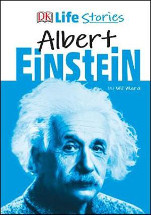Albert Einstein by Wil Mara

Ill. by Charlotte Agar. Penguin Random House, 2019. ISBN
9780241322918.
(Age: 10+) Recommended. Albert Einstein is perhaps best known as a
remarkable scientist, but he was also a complex human being. He was
a brilliant but rebellious student, a patent clerk whose theories
about physics and cosmology transformed our understanding of the
universe, a Nobel Prize winner, an activist for peace and a refugee
from Fascism. Einstein was a pacifist but his warning about Hitler's
plan to develop an atomic bomb contributed to the American
government's decision to create nuclear weapons.
Wil Mara has incorporated the elements of Einstein' life into an
engaging and informative narrative that interweaves the scientist's
personal life and experiences with explanations of scientific
concepts and political turmoil. Mara's writing is particularly
effective when providing insights into Einstein's state of mind,
whether it was his childhood loneliness, his lifelong curiosity, his
passion for music or his determined opposition to racism and armed
conflict. The breakdown of Einstein's first marriage and the regret
he felt after atomic bombs were dropped on Japan are described with
directness and sensitivity.
Short, well-constructed sentences and a large font facilitate
reading by a younger audience. Text boxes which explain scientific
theories and historical events, photographs and hand-drawn
illustrations add to the reader's understanding without intruding on
the narrative. The family tree, timeline, list of characters,
glossary and index are useful keys to the text. However, a list of
selected references or a brief explanation of the author's research
process might have enhanced the book's credibility.
The mark of an effective biography may be its ability to reveal that
someone who is celebrated for his extraordinary achievements can
also experience doubts and setbacks. If so, then Wil Mara's
biography of Albert Einstein has succeeded in explaining the complex
man behind the famous name.
Elizabeth Bor